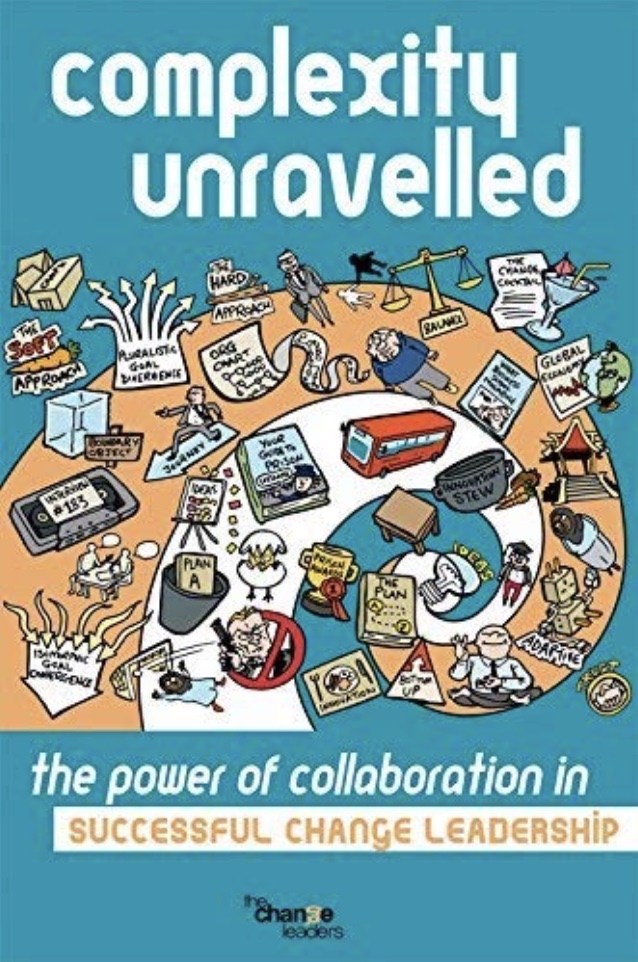Complexity Unravelled

SUMMARY:
Complexity Unravelled examines how change agents in different regions of the world initiate change within the public, private and voluntary sectors. The chapters illustrate different types of change interventions and challenge mainstream approaches to strategic implementation and turnaround efforts. A uniting perspective is the on-going reflections of the change agents and their practice in relation to evaluating and continually improving their style, methods and tools. What can you learn from these personal journeys?
• A comfortable and safe environment for open
communication and information sharing
• A straight line is not always the shortest route
• Find drivers for change in the most unlikely places
• Achieve collective action and a common identity in a
disparate environment
• Temper a target-oriented approach with inclusive
methods to achieve greater success
• Dare to enable bottom-up change leadership
• Raise our inner consciousness to become better
change leaders
The foreword is by Professor Sue Dopson. Each chapter is illustrated by Chris Shipton of graphical recording fame. The seven chapters are written by Lisa Francis-Jennings and Rick Wolfe; Mark Clark; Lars Thuesen and Mark Munger; Philip Willatt and Mary Akimoto; Hanne Dorthe Sørensen and Flemming Bentzen; Thora Lou Haavik and Bent Andersen; and Mason de Chochor.
ENDORSEMENTS:
In the twenty-first century we need to think differently about change and Complexity Unravelled is a thought provoking collection of successful change insights from diverse settings. The Change Leaders have captured personal, proven practices to address complex, challenging change. While the setting may be different, change is fundamentally about human beings and thus the value of this book is in what you can learn and apply to the human change challenges you are facing.
Donna Brighton, President of the Board of Directors, Association of Change Management Professionals (ACMP) With the sharing of seven courageously honest stories, this book unravels what it takes to be change agents in a complex world. These change facilitators’ experiences and hard won wisdom shine a guiding light in our turbulent and often chaotic endeavours, by telling us to find the real change agents far from the usual suspects, tempering our eagerness by going slow to go fast, above all to promote change by not engaging in behaviour and social change. Their compelling and humbling stories speak of respect, trust and relationship building for collective action as the most endearing and lasting values to emulate in leaders. A must-read for any change agent.
Monique Sternin, Adjunct Associate Professor, Positive Deviance Initiative, Friedman School of Nutrition Science & Policy, Tufts University, Boston
The Change Leaders is a unique group of creative and reflective change agents, from a great diversity of countries and social contexts. This book is a good illustration of who they are. It is worth reading by any practitioner of change; beneath the amazing diversity of change cases they deal with, one can see the common ground of their practice: focused on human beings, complexity friendly. Welcome to the 21st century!
Denis Bourgeois, Emeritus Professor, HEC Paris The book is a wonderful resource for leaders embarking on change efforts and a tribute to the alumni network that has provided the supportive context for such a contribution. Professor Sue Dopson, Rhodes Trust Professor of Organisational Behaviour, Saïd Business School, University of Oxford
A very insightful collection of essays and a must-read for change practitioners. In the true spirit of the HEC-Oxford Consulting and Coaching for Change programme, it successfully marries theoretical reflection, rich practice and most of all, personal voice. Enjoyable all through.
Elie Matta, Associate Professor in Management, HEC Paris These stories come from people catalyzing real change in settings that range from business schools to refugee camps. They describe their efforts, setbacks and modest but significant triumphs as sculptors of human experience. Art Kleiner, editor-in-chief, strategy+business; author, The Age of Heretics.
THE AUTHORS:
Mary Akimoto (co-author to Philip Willatt) is an independent Organisational Development consultant who has advised London Business School on a number of key initiatives over the past decade. She has spent most of her career leading change, as a senior management team member and as a management consultant. This experience has been instrumental in providing insight to client firms in the private and public sector, especially with regard to winning hearts and minds while maintaining a strategic focus.
Bent Andersen (co-author to Thora Lou Haavik) is a senior consultant at AFF at the Norwegian School of Economics (NHH) and holds an MSc. in Business Administration from NHH, in addition to a University degree in Organisation Theory and Public Administration from the University of Bergen. He has broad experience in major change projects and considerable leadership experience. Currently Bent is working as project manager for organisation and leadership development programs, strategy, mentoring, and leader group development.
Mark Clark (CCC cohort 9) is passionate about change; in individuals, communities, and organisations. As CEO of Generations For Peace, an international non-profit dedicated to conflict transformation in communities, supporting volunteers in 50 countries, his role combines these three elements, guiding organisational development to support behaviour change and conflict transformation in diverse contexts of conflict and violence.
Mason de Chochor (CCC cohort 9) has over 30 years of managerial experience, coaching and leading corporate teams, mainly in the financial industry. His yoga training, teaching and practice have been central to all of his activities. He continues to teach Kundalini Yoga and Yoga Nidra. His coaching assignments draw from Energy Management techniques, focusing on Mindfulness and Meditative Awareness.
Lisa Francis-Jennings (CCC cohort 3) (MSc.) is the co-founder and Managing Director of StratAffect S.A., which specialises in helping clients realise opportunities from high-impact strategic interventions. Lisa uses a unique combination of facilitated processes to help align organisational focus. Her ability to recognise the essential qualities of a situation and to connect disparate elements, helps her clients design creative business solutions.
Thora Lou Haavik (CCC cohort 10) is a senior consultant at AFF at the Norwegian School of Economics (NHH), specialised in processes of strategic change. She holds a degree in production engineering from The Technical University of Denmark, an MSc. in Consulting and Coaching for Change from HEC Paris and Oxford University, in addition to micro- and macroeconomics from Copenhagen Business School and a professional coaching certification from ITS London.
Mark Munger (co-author to Lars Thuesen) a graduate of Princeton and Harvard Universities, is a senior consultant with the Plexus Institute, Washington, D.C. USA. He is an experienced organisation consultant and educator, and has been part of the Positive Deviance movement in the US since its inception. He has used the adaptive positive deviance approach to effect behavioural and social change in hospital and health care settings, schools facing significant challenges, and urban and rural food systems. He has worked in Denmark over time for the Prison and Probation Service of the Danish Ministry of Justice, and in such varied settings as clinical trials in oncology research and treatment.
Hanne Dorthe Sørensen (CCC cohort 5) is former CEO of The Government Centre of Human Resource Development and has an Executive Masters in Coaching and Consulting for Change from HEC. She is currently an independent consultant as well as being associate professor of the Copenhagen Business School. She has recently launched a book on new welfare leadership and is specialised in training and coaching public leaders in new metal models of leadership and action learning.
Flemming Bentzen (co-author to Hanne Dorthe Sørensen) is former Head of Unit at The National Board of Industrial Injuries in Denmark and has a Masters of Management Development from Copenhagen Business School. He is currently Head of Unit in the Danish Working Environment Agency.
Lars Thuesen (CCC cohort 4) is a change leader, who has 20 years’ experience as a leader and senior civil servant, facilitator and consultant in the public sector. Most recently he held the position as head of innovation in the Danish Ministry of Justice, Department of Prison and Probation. In 2014, Lars founded WIN – the Welfare Improvement Network, where he works as a change leader and consultant. Lars is deeply passionate about solving some of the most pressing social challenges in our welfare societies. His work focusses on how to create sustainable solutions in the communities where he facilitates change processes, combining different approaches to obtain the best possible impact. He has an MSc. in Political Science and an MSc. in Coaching and Consulting for Change from HEC, where he also trains executive students in the Positive Deviance methodology.
Philip Willatt (CCC cohort 9) is the former Director, Human Resources at London Business School, where he completed 13 very full years. He has three main areas of focus: designing a new approach to human resource management for the School, embedding the outcomes of the Vision and Values project, and initiating an institutional approach to change. Prior to London Business School, he held a similar position at the University of Sussex, and before that he worked for the BBC in a variety of roles. Rick Wolfe (co-author to Lisa Francis-Jennings) is the Founder and Owner of Post Stone; a boutique consulting firm providing customer-facing business development methodologies and tools for organisations of all sizes. Rick’s services are designed to deliver rapid strategic insight into customer relationships and deliver immediate business development opportunities and performance improvements. Whether looking for new customer insight or to confirm strategic direction, Rick’s methods produce quick and effective solutions.
ACKNOWLEDGEMENTS:
Like many of these kinds of endeavours, this was very much of a journey. It included its fair share of creativity, discussion, agreement, disagreement, collaboration, dedication and flexibility. Above all, its leitmotiv was trust. For that, our kind acknowledgements to all involved. More specifically, thanks to the Change Leaders and its Board who trusted us completely in the process. Back in September 2014, the first Change Leaders’ Book was produced, thanks to the then Book Team led by Joanne Flinn. Without that book, this one probably would not have seen the light of day.
The previous book team was a great help in the first uncertain days of this new project, especially Dan Ballbach and Mike Staresinic, as well as Julia Beck, Mason de Chochor, Cécile Demailly, Elizabeth Howard, Hugh McDermott and Dorthe Sørensen, who were also involved in the creative discussion around the focus and approach to this book. I have to mention Art Kleiner, whose workshop at Oxford in September 2011 ‘Introduction to Thought Leadership’ provided us with the writing template for the chapters.
Mason de Chochor, Patricia Cichocki, Lisa Francis- Jennings, Dirk Glienke, Susan Goldsworthy, Hugh McDermott generously volunteered to partake in the editing process, to guide the authors during their initial writing stage.
The book would be a rather thin affair without the authors – Lisa Francis-Jennings, Rick Wolfe, Mark Clark, Lars Thuesen, Mark Munger, Philip Willatt, Mary Akimoto, Hanne Dorthe Sørensen, Flemming Bentzen, Thora Lou Haavik, Bent Andersen and Mason de Chochor.
I’d like to thank our illustrious members of the faculty in Oxford and HEC, who offered to provide academic guidance and who over the years have greatly contributed to the way we approach change: Denis Bourgeois, Sue Dopson, Elizabeth Howard, Elie Matta and Rafael Ramirez. Special thanks to Professor Sue Dopson, for generously agreeing to write a foreword to this book Heartfelt thanks to Julia Beck for her work in designing the cover, Chris Shipton for his illustrations, Julia Beck and Lisa Francis-Jennings for those long discussions around book naming, Right On the Line for the layout and Fast Print Publishing for being such a patient printer. Finally, special thanks to my ‘partner in crime’ Lisa Francis-Jennings, who was a tremendous partner in the final editing stage, when we came at it from a publisher’s perspective.
The work was often arduous, repetitive and at times frustrating. We got there in the end. All of us. Together. Julie Mowinski – Chief Editor for “Complexity Unravelled”
EDITOR’S PREFACE
Change today affects all of us, every day, in all walks of life, whether we are conscious of it or not. To a large extent, this defines the issues surrounding strategic change in organisational structures. Leadership may recognise the need for organisational effectiveness and agility, but often the process of attaining it is hampered by calls for ‘quick fixes’ and ‘one-size-fits-all’ change programs, which mostly end up as botched efforts. And still, change management is big business.
This book illustrates why change is so difficult, and how thoughtful approaches to change leadership can produce the most amazing results, many of which could not have been pre-determined. This is scary stuff – after all, if we cannot define the ‘what’ and the ‘how’, where does our power reside?
Maybe we are looking for power in all the wrong places. Mark Clark’s chapter clearly demonstrates the weakness of the planned change approach in a culturally diverse environment. And culture is a hot topic these days. It has been identified as an inhibiting factor in the success of many change programs. ‘Culture kills Strategy’ is a common phrase¹ which reflects the intangible essence of humanity that, let’s face it, makes up the largest portion of any organisation.
Harnessing culture and leveraging employees’ energy to address the complexities of building sustainable change is illustrated in Dorthe Sørensen and Flemming Bentzen’s chapter. Philip Willatt and Mary Akimoto’s account of bridging various cultural groups within an educational establishment describes the challenge of addressing departmental identity differentiation while elements within the industry are converging. The authors provide an excellent example of highly customised engagement practices, which address issues faced by many professional service organizations today.
Thora Haavik and Bent Andersen’s description of merging two organisational mind-sets shows how creating trust and building upon successes can set a new culture in motion. Go one step further and you find yourself in Lars Thuesen and Mark Munder’s violent world of prison life, where discovering the ‘outliers’ and focusing on respect and positive relationships are major drivers of change. If the basic elements of decent humanity can be harnessed in such an extreme environment, surely this is a clear indication of where change leadership is headed.
Shifting to a more personal perspective, Mason de Chochor takes us on a journey within ourselves, to discover our own humanity, as a pre-requisite for this new direction. And Lisa Francis-Jennings and Rick Wolfe provide us with a template for how we can exteriorise all this, and collaborate in a safe environment.
We hope you enjoying reading this. More than this, we hope it changes the way you think about change. Join in our conversation at www.thechangeleaders.com . Julie Mowinski & Lisa Francis-Jennings ¹ Merchant, N. (2011) ‘Culture Trumps Strategy, Every Time’, Harvard Business Review, (online) https://hbr.org/ 2011/03/culture-trumps-strategy-every
ABOUT THE AUTHOR:
Julie Mowinski Julie Mowinski is a communications professional, with broad global experience in the Information Technology sector – hardware, software, services and telecommunications. She has held roles in marketing, communications, and general management for companies in a number of different countries including Cisco, Software AG, Berg Electronics and Holland House. She has also been involved in acquisition negotiation, transformation, employee development, mentoring and inclusion & diversity. Having recently completed a Master’s degree in Consulting and Coaching for Change from the HEC business school in collaboration with the Saïd Business School at Oxford University, she is currently examining how to help companies capitalise on communication to drive successful change.




